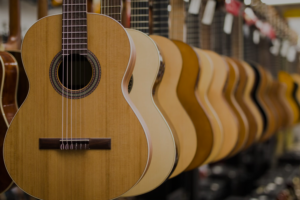Guitar Class in Kolkata
Electronic keyboards and guitars are popular in Kolkata. School and college bands require a guitarist and a keyboardist. Though the drummer is the coolest guy, the melody players are central to a musical format. There are many self-taught guitarists in the city. However, it is advisable to learn under sound supervision. Selecting a guitar class in Kolkata is not an easy job. One hears different comments and self-prophecies. Let us try to understand logically. Guitar is a European musical instrument. The correct way to learn it is by following the staff notation. Playing by ear or following the tab notation is fine, but a musician must read and write staff notation, the only failproof musical language. Improvisation is fantastic, but one cannot ignore building a solid foundation. A music school like the Academy for Musical Excellence offers sequentially graded guitar courses for children and adults. Teachers follow the guitar book series like the Suzuki and Mel Bay. Sequential graded guitar books by Surendranath Majumdar contain Indian songs and the evergreen world music. Musicians use the guitar as an accompanying and lead instrument. Plectrum (steel string) guitar, classical (nylon string) guitar, electric guitar, and bass guitar are the four types of guitar. Before selecting guitar classes in Kolkata, one should decide the guitar they wish to learn. Recognized guitar festivals in Kolkata that inspire children and youth to participate. Guitarists from Kolkata participate in various national and international events. Contrary to the false belief that one may become a pro guitarist within a few years is untrue. It takes years of learning, performing and upgradation to become a guitarist. As a student, you may play a few tunes in a few weeks if you join an authentic guitar class in Kolkata. Months of proper training will facilitate you to read and play tunes yourself.

The guitar grew in popularity during the 17th century as the lute and vihuela declined. It remained an amateur instrument from the 17th to early 19th century. A few virtuoso guitarists, however, became known in Europe, among them Gaspar Sanz (flourished 1674), Robert de Visée (c. 1650–1725), Fernando Sor (1778–1839), and Joseph Kaspar Mertz (1806–56). Modern classical guitar technique owes much to the Spaniard Francisco Tárrega (1852–1909), whose transcriptions of works by Bach, Mozart, and other composers formed the basis of the concert repertory. In the 20th century, Andrés Segovia gave the guitar further prominence as a concert instrument, and composers such as Heitor Villa-Lobos and Manuel de Falla wrote significant works. The American guitar history is fascinating and probably will come up in another article. Develop your music listening habits as you may hear music from diverse traditions around the globe. It will help you to improve your musical understanding and playing skills.